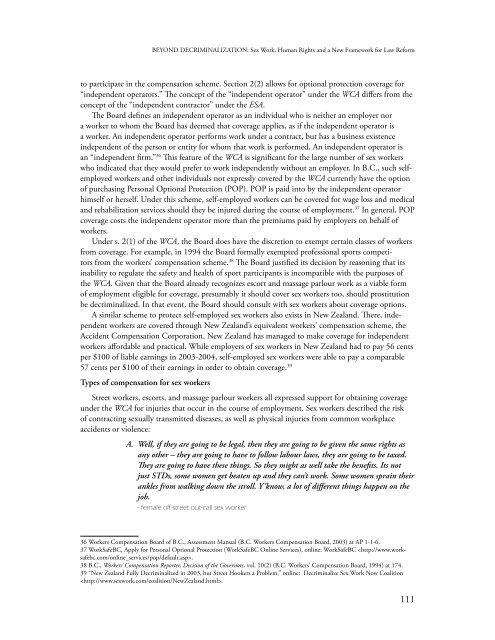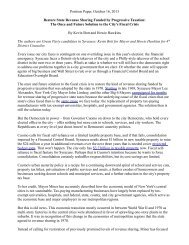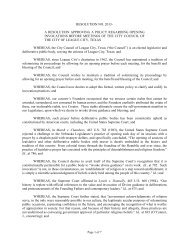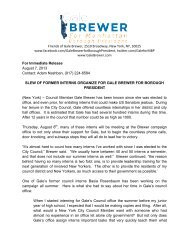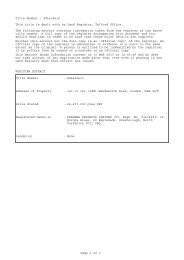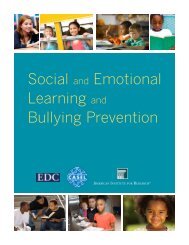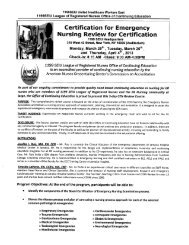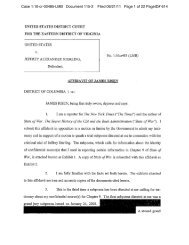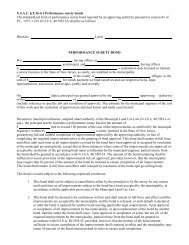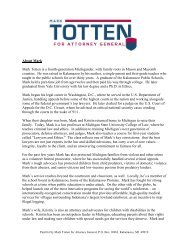PIVOT LEGAL SOCIETYOnce a <strong>work</strong>er’s claim is accepted <strong>and</strong> they are receiving benefits, the benefits can be suspended if:the <strong>work</strong>er does not attend or co-operate in a medical examination or program arranged by the Board;fails to participate in any activity that might delay their recovery; refuse treatment recommended bythe Board; or they are found to have made a fraudulent claim.<strong>Sex</strong> <strong>work</strong>ers <strong>and</strong> <strong>work</strong>ers’ compensationMany sex <strong>work</strong>ers supported becoming part of a <strong>work</strong>ers’ compensation scheme:A. Yeah, you should have to pay in a certain amount every month towards a Workers’compensation package, <strong>and</strong> then if you’re injured on the job you should be able tocollect just like everyone else.- female off-street out-call sex <strong>work</strong>erOne sex <strong>work</strong>er suggested that access to <strong>work</strong>ers’ compensation would assist in dispelling the notion thatsex <strong>work</strong>ers deserve the harm they experience on the job:A. To me, that’s the flawed thinking that goes around prostitution – because you aredoing it, or because you choose to do it, or whatever. That you deserve the repercussionsof that.- female off-street out-call sex <strong>work</strong>erThe WCA would apply in situations where sex <strong>work</strong>ers meet the definition of “<strong>work</strong>ers” under theWCA. 31 This is a broad definition that includes both employees <strong>and</strong> independent contractors whereadmitted by the Board under s. 2(2) of the WCA.<strong>Sex</strong> <strong>work</strong>ers in massage parlours, steam baths <strong>and</strong> in the escort service industry are currentlycovered under the WCA. However, many such establishments are currently <strong>work</strong>ing under the notionthat their <strong>work</strong>ers are independent contractors when, in fact, they would not be viewed as such underthe law. Thus, it is unclear at present how many employers are currently paying premiums to ensurecoverage for their <strong>work</strong>ers, <strong>and</strong> how many are neglecting to pay for coverage, thereby violating theWCA. Service Sector employees in these industries are classified under the category “accommodation,food, <strong>and</strong> leisure services.” 32 In 2005, employers in this industry group, which also includes tanningsalons <strong>and</strong> hair styling <strong>work</strong>ers, had to pay 79 cents per $100 of the assessable payroll, to a maximumannual wage per <strong>work</strong>er of $61,300. By way of comparison, in the Service Sector “business services”group, the employers of clerical <strong>work</strong>ers paid 58 cents per $100 of the assessable payroll, 33 while inthe “construction industry” group employers of building demolition <strong>work</strong>ers paid $5.91 per $100 in2005. 34 Thus, the premiums that sex industry employers currently pay are higher than those for someother businesses.Persons <strong>work</strong>ing independently <strong>and</strong> without an employer, such as most street-level sex <strong>work</strong>ers<strong>and</strong> many escorts, have to be admitted for coverage by the Board under s. 2(2) of the WCA 35 in order31 Worker means (a) a person who has entered into or <strong>work</strong>s under a contract of service or apprenticeship, written or oral, express orimplied, whether by way of manual labour or otherwise; (b) a person who is a learner, although not under a contract of service or apprenticeship,who becomes subject to the hazards of an industry within the scope of Part 1 for the purpose of undergoing training orprobationary <strong>work</strong> specified or stipulated by the employer as a preliminary to employment; or (f) an independent operator admittedby the Board under s. 2(2). WCA, supra note 6, s. 1.32 WorkSafeBC, Classification Unit No. 761021 (Classification Unit Description), online: WorkSafe BC .33 WorkSafeBC, Classification Unit No.762010 (Classifications Unit Description), online: WorkSafeBC .34 WorkSafeBC, Classification Unit No.721005 (Classifications Unit Description), online: WorkSafeBC .35 WCA, supra note 6, s. 2 (2): The Board may direct that this Part applies on the terms specified in the Board’s direction: (a) toan independent operator who is neither an employer nor a <strong>work</strong>er as though the independent operator was a <strong>work</strong>er, or (b) to anemployer as though the employer was a <strong>work</strong>er.110
BEYOND DECRIMINALIZATION: <strong>Sex</strong> Work, <strong>Human</strong> <strong>Rights</strong> <strong>and</strong> a <strong>New</strong> Frame<strong>work</strong> for Law Reformto participate in the compensation scheme. Section 2(2) allows for optional protection coverage for“independent operators.” The concept of the “independent operator” under the WCA differs from theconcept of the “independent contractor” under the ESA.The Board defines an independent operator as an individual who is neither an employer nora <strong>work</strong>er to whom the Board has deemed that coverage applies, as if the independent operator isa <strong>work</strong>er. An independent operator performs <strong>work</strong> under a contract, but has a business existenceindependent of the person or entity for whom that <strong>work</strong> is performed. An independent operator isan “independent firm.” 36 This feature of the WCA is significant for the large number of sex <strong>work</strong>erswho indicated that they would prefer to <strong>work</strong> independently without an employer. In B.C., such selfemployed<strong>work</strong>ers <strong>and</strong> other individuals not expressly covered by the WCA currently have the optionof purchasing Personal Optional Protection (POP). POP is paid into by the independent operatorhimself or herself. Under this scheme, self-employed <strong>work</strong>ers can be covered for wage loss <strong>and</strong> medical<strong>and</strong> rehabilitation services should they be injured during the course of employment. 37 In general, POPcoverage costs the independent operator more than the premiums paid by employers on behalf of<strong>work</strong>ers.Under s. 2(1) of the WCA, the Board does have the discretion to exempt certain classes of <strong>work</strong>ersfrom coverage. For example, in 1994 the Board formally exempted professional sports competitorsfrom the <strong>work</strong>ers’ compensation scheme. 38 The Board justified its decision by reasoning that itsinability to regulate the safety <strong>and</strong> health of sport participants is incompatible with the purposes ofthe WCA. Given that the Board already recognizes escort <strong>and</strong> massage parlour <strong>work</strong> as a viable formof employment eligible for coverage, presumably it should cover sex <strong>work</strong>ers too, should prostitutionbe decriminalized. In that event, the Board should consult with sex <strong>work</strong>ers about coverage options.A similar scheme to protect self-employed sex <strong>work</strong>ers also exists in <strong>New</strong> Zeal<strong>and</strong>. There, independent<strong>work</strong>ers are covered through <strong>New</strong> Zeal<strong>and</strong>’s equivalent <strong>work</strong>ers’ compensation scheme, theAccident Compensation Corporation. <strong>New</strong> Zeal<strong>and</strong> has managed to make coverage for independent<strong>work</strong>ers affordable <strong>and</strong> practical. While employers of sex <strong>work</strong>ers in <strong>New</strong> Zeal<strong>and</strong> had to pay 56 centsper $100 of liable earnings in 2003-2004, self-employed sex <strong>work</strong>ers were able to pay a comparable57 cents per $100 of their earnings in order to obtain coverage. 39Types of compensation for sex <strong>work</strong>ersStreet <strong>work</strong>ers, escorts, <strong>and</strong> massage parlour <strong>work</strong>ers all expressed support for obtaining coverageunder the WCA for injuries that occur in the course of employment. <strong>Sex</strong> <strong>work</strong>ers described the riskof contracting sexually transmitted diseases, as well as physical injuries from common <strong>work</strong>placeaccidents or violence:A. Well, if they are going to be legal, then they are going to be given the same rights asany other – they are going to have to follow labour laws, they are going to be taxed.They are going to have these things. So they might as well take the benefits. Its notjust STDs, some women get beaten up <strong>and</strong> they can’t <strong>work</strong>. Some women sprain theirankles from walking down the stroll. Y’know, a lot of different things happen on thejob.- female off-street out-call sex <strong>work</strong>er36 Workers Compensation Board of B.C., Assessment Manual (B.C. Workers Compensation Board, 2003) at AP 1-1-6.37 WorkSafeBC, Apply for Personal Optional Protection (WorkSafeBC Online Services), online: WorkSafeBC .38 B.C., Workers’ Compensation Reporter, Decision of the Governors, vol. 10(2) (B.C. Workers’ Compensation Board, 1994) at 174.39 “<strong>New</strong> Zeal<strong>and</strong> Fully Decriminalized in 2003, but Street Hookers a Problem,” online: Decriminalize <strong>Sex</strong> Work Now Coalition.111
- Page 4:
PIVOT LEGAL SOCIETYPart 2: Municipa
- Page 21 and 22:
BEYOND DECRIMINALIZATION: Sex Work,
- Page 23 and 24:
BEYOND DECRIMINALIZATION: Sex Work,
- Page 25 and 26:
BEYOND DECRIMINALIZATION: Sex Work,
- Page 27 and 28:
BEYOND DECRIMINALIZATION: Sex Work,
- Page 29 and 30:
BEYOND DECRIMINALIZATION: Sex Work,
- Page 31 and 32:
BEYOND DECRIMINALIZATION: Sex Work,
- Page 33 and 34:
BEYOND DECRIMINALIZATION: Sex Work,
- Page 35 and 36:
BEYOND DECRIMINALIZATION: Sex Work,
- Page 37 and 38:
BEYOND DECRIMINALIZATION: Sex Work,
- Page 39 and 40:
BEYOND DECRIMINALIZATION: Sex Work,
- Page 41 and 42:
BEYOND DECRIMINALIZATION: Sex Work,
- Page 43 and 44:
BEYOND DECRIMINALIZATION: Sex Work,
- Page 45 and 46:
BEYOND DECRIMINALIZATION: Sex Work,
- Page 47 and 48:
BEYOND DECRIMINALIZATION: Sex Work,
- Page 49 and 50:
BEYOND DECRIMINALIZATION: Sex Work,
- Page 51 and 52:
BEYOND DECRIMINALIZATION: Sex Work,
- Page 53 and 54:
BEYOND DECRIMINALIZATION: Sex Work,
- Page 55 and 56:
BEYOND DECRIMINALIZATION: Sex Work,
- Page 57 and 58:
BEYOND DECRIMINALIZATION: Sex Work,
- Page 59 and 60: BEYOND DECRIMINALIZATION: Sex Work,
- Page 61 and 62: BEYOND DECRIMINALIZATION: Sex Work,
- Page 63 and 64: BEYOND DECRIMINALIZATION: Sex Work,
- Page 65 and 66: BEYOND DECRIMINALIZATION: Sex Work,
- Page 67 and 68: BEYOND DECRIMINALIZATION: Sex Work,
- Page 69 and 70: BEYOND DECRIMINALIZATION: Sex Work,
- Page 71 and 72: BEYOND DECRIMINALIZATION: Sex Work,
- Page 73 and 74: BEYOND DECRIMINALIZATION: Sex Work,
- Page 75 and 76: BEYOND DECRIMINALIZATION: Sex Work,
- Page 77 and 78: BEYOND DECRIMINALIZATION: Sex Work,
- Page 79 and 80: BEYOND DECRIMINALIZATION: Sex Work,
- Page 81 and 82: BEYOND DECRIMINALIZATION: Sex Work,
- Page 83 and 84: BEYOND DECRIMINALIZATION: Sex Work,
- Page 85 and 86: BEYOND DECRIMINALIZATION: Sex Work,
- Page 87 and 88: BEYOND DECRIMINALIZATION: Sex Work,
- Page 89 and 90: BEYOND DECRIMINALIZATION: Sex Work,
- Page 91 and 92: BEYOND DECRIMINALIZATION: Sex Work,
- Page 93 and 94: BEYOND DECRIMINALIZATION: Sex Work,
- Page 95 and 96: BEYOND DECRIMINALIZATION: Sex Work,
- Page 97 and 98: BEYOND DECRIMINALIZATION: Sex Work,
- Page 99 and 100: BEYOND DECRIMINALIZATION: Sex Work,
- Page 101 and 102: BEYOND DECRIMINALIZATION: Sex Work,
- Page 103 and 104: BEYOND DECRIMINALIZATION: Sex Work,
- Page 105 and 106: BEYOND DECRIMINALIZATION: Sex Work,
- Page 107 and 108: BEYOND DECRIMINALIZATION: Sex Work,
- Page 109: BEYOND DECRIMINALIZATION: Sex Work,
- Page 113 and 114: BEYOND DECRIMINALIZATION: Sex Work,
- Page 115 and 116: BEYOND DECRIMINALIZATION: Sex Work,
- Page 117 and 118: BEYOND DECRIMINALIZATION: Sex Work,
- Page 119 and 120: BEYOND DECRIMINALIZATION: Sex Work,
- Page 121 and 122: BEYOND DECRIMINALIZATION: Sex Work,
- Page 123 and 124: BEYOND DECRIMINALIZATION: Sex Work,
- Page 125 and 126: BEYOND DECRIMINALIZATION: Sex Work,
- Page 127 and 128: BEYOND DECRIMINALIZATION: Sex Work,
- Page 129 and 130: BEYOND DECRIMINALIZATION: Sex Work,
- Page 131 and 132: BEYOND DECRIMINALIZATION: Sex Work,
- Page 133 and 134: BEYOND DECRIMINALIZATION: Sex Work,
- Page 135 and 136: BEYOND DECRIMINALIZATION: Sex Work,
- Page 137 and 138: BEYOND DECRIMINALIZATION: Sex Work,
- Page 139 and 140: BEYOND DECRIMINALIZATION: Sex Work,
- Page 141 and 142: BEYOND DECRIMINALIZATION: Sex Work,
- Page 143 and 144: BEYOND DECRIMINALIZATION: Sex Work,
- Page 145 and 146: BEYOND DECRIMINALIZATION: Sex Work,
- Page 147 and 148: BEYOND DECRIMINALIZATION: Sex Work,
- Page 149 and 150: BEYOND DECRIMINALIZATION: Sex Work,
- Page 151 and 152: BEYOND DECRIMINALIZATION: Sex Work,
- Page 153 and 154: BEYOND DECRIMINALIZATION: Sex Work,
- Page 155 and 156: BEYOND DECRIMINALIZATION: Sex Work,
- Page 157 and 158: BEYOND DECRIMINALIZATION: Sex Work,
- Page 159 and 160: BEYOND DECRIMINALIZATION: Sex Work,
- Page 161 and 162:
BEYOND DECRIMINALIZATION: Sex Work,
- Page 163 and 164:
BEYOND DECRIMINALIZATION: Sex Work,
- Page 165 and 166:
BEYOND DECRIMINALIZATION: Sex Work,
- Page 167 and 168:
BEYOND DECRIMINALIZATION: Sex Work,
- Page 169 and 170:
BEYOND DECRIMINALIZATION: Sex Work,
- Page 171 and 172:
BEYOND DECRIMINALIZATION: Sex Work,
- Page 173 and 174:
BEYOND DECRIMINALIZATION: Sex Work,
- Page 175 and 176:
BEYOND DECRIMINALIZATION: Sex Work,
- Page 177 and 178:
BEYOND DECRIMINALIZATION: Sex Work,
- Page 179 and 180:
BEYOND DECRIMINALIZATION: Sex Work,
- Page 181 and 182:
BEYOND DECRIMINALIZATION: Sex Work,
- Page 183 and 184:
BEYOND DECRIMINALIZATION: Sex Work,
- Page 185 and 186:
BEYOND DECRIMINALIZATION: Sex Work,
- Page 187 and 188:
BEYOND DECRIMINALIZATION: Sex Work,
- Page 189 and 190:
BEYOND DECRIMINALIZATION: Sex Work,
- Page 191 and 192:
BEYOND DECRIMINALIZATION: Sex Work,
- Page 193 and 194:
BEYOND DECRIMINALIZATION: Sex Work,
- Page 195 and 196:
BEYOND DECRIMINALIZATION: Sex Work,
- Page 197 and 198:
BEYOND DECRIMINALIZATION: Sex Work,
- Page 199 and 200:
BEYOND DECRIMINALIZATION: Sex Work,
- Page 201 and 202:
BEYOND DECRIMINALIZATION: Sex Work,
- Page 203 and 204:
BEYOND DECRIMINALIZATION: Sex Work,
- Page 205 and 206:
BEYOND DECRIMINALIZATION: Sex Work,
- Page 207 and 208:
BEYOND DECRIMINALIZATION: Sex Work,
- Page 209 and 210:
BEYOND DECRIMINALIZATION: Sex Work,
- Page 211 and 212:
BEYOND DECRIMINALIZATION: Sex Work,
- Page 213 and 214:
BEYOND DECRIMINALIZATION: Sex Work,
- Page 215 and 216:
BEYOND DECRIMINALIZATION: Sex Work,
- Page 217 and 218:
BEYOND DECRIMINALIZATION: Sex Work,
- Page 219 and 220:
BEYOND DECRIMINALIZATION: Sex Work,
- Page 221 and 222:
BEYOND DECRIMINALIZATION: Sex Work,
- Page 223 and 224:
BEYOND DECRIMINALIZATION: Sex Work,
- Page 225 and 226:
BEYOND DECRIMINALIZATION: Sex Work,
- Page 227 and 228:
BEYOND DECRIMINALIZATION: Sex Work,
- Page 229:
BEYOND DECRIMINALIZATION: Sex Work,


